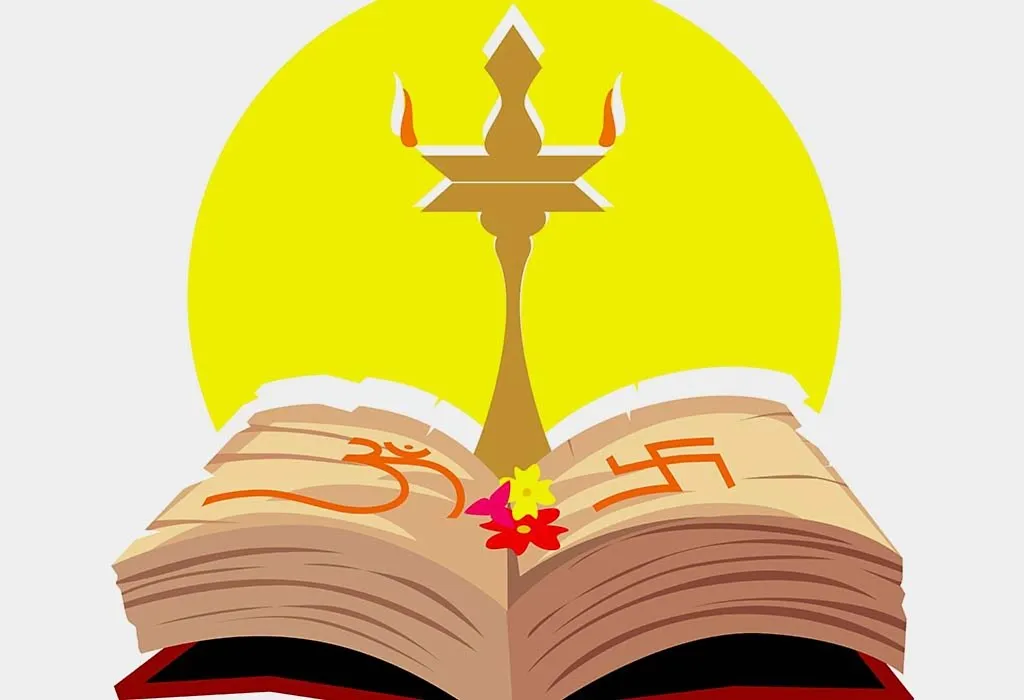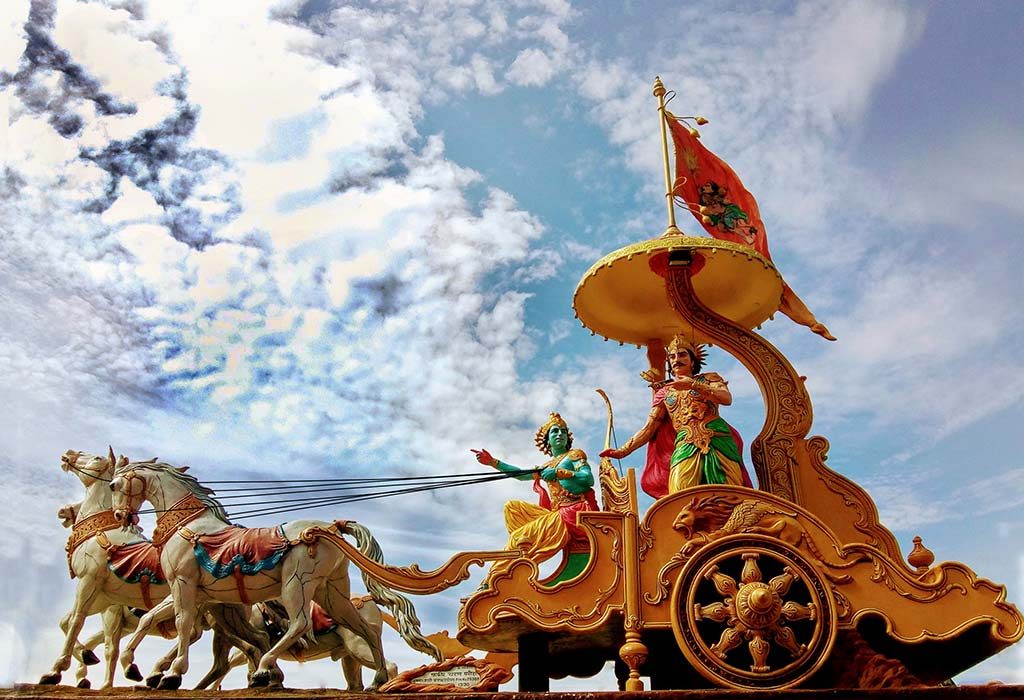Mahabharata Story in English for Kids
Mahabharata is a literary treasure and a blend of Hindu mythology and philosophy. It is considered to be for adults only. But this great epic is more than that. Its varied stories and many characters have an appeal for the kids too. In fact, it is a treasure trove for today’s generation raised on Harry Potter and likewise tales. It has countless stories that teach valuable lessons in ethics and morality. This great epic is a part of our culture and should have a rightful place in the hearts of our children. Here are some Mahabharata stories for kids:
What is Mahabharata?
It is one of the two major Hindu Mythological Sanskrit epics of India. It is the narration of the great eighteen-day Kurukshetra war between the hundred Kauravas and the five Pandavas, the children of two brothers. Interwoven with many stories and a multitude of characters, it comprises philosophical and devotional material. It also contains the Bhagwat Gita, the much revered Hindu religious text. Mahabharat is not meant to be read as a pastime for amusement. You have to delve deeply into it and understand the characters and their actions and reactions. Once involved in the story, you will find yourself playing out so many roles, identifying something similar with the characters as they appear in the story.
Mahabharata Story – In Short
Here is the Mahabharat story in English in short:
The story begins with Hastinapur’s King Shantanu of the Kuru dynasty marrying river Goddess Ganga. Bhishma, one of the prominent characters in Mahabharata, was their son. Ganga left them to carry out her godly duties, and Shantanu married Satyavati and had two sons with her. Vichitravirya, one of the sons, became the king after him. He fathered three sons, Dhritarashtra, Pandu and Vidur. Dhritarashtra being blind, Pandu became the king supported by Bhishma.
Dhritarashtra married Gandhari and had a hundred sons, the Kauravas. Pandu married Kunti and Madri, and with the blessings of different gods, the five Pandavas were born. Unknown to everyone, Kunti was already an unwed mother to her oldest son, Karna.
Having brought prosperity to his kingdom, Pandu decided to retire to the forest, entrusting the kingdom to the care of Dhritarashtra. After Pandu and Madri’s death, Kunti came back to Hastinapur with the five boys. The cousins, Kauravas, and Pandavas never got along. There were failed attempts by the Kauravas to kill them. And after one such conspiracy, the Pandavas with their mother went into hiding. In this period, Arjun married Draupadi, and they all went back to Hastinapur. But they were exiled to the forest for thirteen years when in a game of dice, Yudhishthir lost everything to the Kauravas. On their return, Duryodhana refused to give back the kingdom, and the stage was set for the greatest battle despite Lord Krishna’s attempts to bring peace. The war went on for eighteen days and ended with the defeat of the Kauravas. Yudhishthir was crowned the King.

Mahabharata Stories For Children
This lengthy epic has hundreds of stories, many for the children also. Here are some well known Mahabharata stories for kids.
1. Arjun and the Bird’s Eye Test
The Kauravas and the Pandavas were given an archery test by their Guru, Dronacharya. They were asked to aim at the eye of a toy bird on the branch of a tree. When the teacher asked them what they saw, with the exception of Arjun, all others claimed to see the sky, trees, the bird, the leaves, the branches, etc. Only Arjun said that he just saw the blackness of the bird’s eye. Only he was permitted to shoot at the target, which he did successfully.
2. Abhimanyu and the Chakravyuh
Abhimanyu, while in his mother’s womb, had learned how to break the Chakravyuh, an intricate battle formation. On the thirteenth day of the great battle, the sixteen-year-old youth fought bravely against the experienced, much older warriors and reached the centre of the circular formation where Duryodhana was. The Kauravas rushed to save Duryodhana and attacked Abhimanyu. Unfortunately, Abhimanyu had not learned how to exit the formation. He put up a great fight and killed many great warriors before he himself was killed.
3. Eklavya and Dronacharya
Eklavya, a tribal boy was refused to be taken as a disciple to learn archery by Guru Dronacharya who taught only the Kshatriyas and the Brahmins. Undeterred, he kept a clay image of Dronacharya before him and practised archery becoming very proficient in it. Once, disturbed by the barking of a dog, he shot arrows in its mouth to shut it up without hurting it. When this feat came into the notice of Arjun, he was upset that there was a better archer than he was. Not wanting to have a rival archer against Arjuna and observing that Eklavya had his image as the teacher, Dronacharya asked him for Guru Dakshina, the offering to be made to the teacher. On being asked what he could offer, Dronacharya asked for his right thumb knowing well that without the thumb he could not shoot. Without hesitation, Eklavya cut his thumb with a knife and placed it at the Guru’s feet. With this deed, he immortalized himself as the epitome of an ideal student.
4. The Story of King Shibi
King Shibi was known for his truthfulness, being just, and keeping his word. The gods Agni and Indra decided to test these qualities. They assumed the forms of a dove and a hawk, the latter pursuing the former. The dove sought protection with Shibi, who promised to save him. The hawk in anger accused him of depriving him of his rightful food. The king, in reply, offered flesh from his own body to appease his hunger. The hawk asked for flesh equal to the weight of the dove. A balance was brought, and the king started cutting flesh from his body, but the dove seemed to be getting heavier with every piece. Finally, the king himself sat in the balance offering his entire body. At this, the gods came into their real forms granting him many boons and the gods above, a witness to this test, showered him with flowers and praise.
5. Ganesha the Scribe
One day, sage Veda Vyasa decided to compose the Mahabharata. He wished that he could dictate the epic and someone could write it down. But who would write down this great epic? After a careful search, Veda Vyasa selected Ganesha, the Lord of Wisdom, to be the scribe. Vyasa claimed that it was only Lord Ganesha who was capable of writing down the epic as he recited it. Ganesha readily agreed to Vyasa’s request but put forth a condition. Lord Ganesha’s request what that the sage dictates the epic to him nonstop. If the sage stopped, Lord Ganesha would leave.
Veda Vyasa agreed to the condition, and the dictation began. It was the longest dictation ever known. Ten million verses were recited by Vyasa, which were written down by Ganesha. That’s why there is no comma to show a pause in the Mahabharata. Sage Veda Vyasa did not stop after completing a sentence either. But Lord Ganesha knew when the sentence ended, and marked it quickly with a stop to move on to the next sentence.
Sage Veda Vyasa was an old man, and so, continuous dictation tired him. Sometimes, he desperately needed a break. At such times, he would use a difficult bunch of words. Even Lord Ganesha found them difficult. As Lord Ganesha scratched his head, the old sage took a deep breath and quickly gulped some water to regain strength. He would then be ready with the next line by the time Ganesha figured out the meaning and wrote down the words.
That is why they say we occasionally come across difficult passages in the Mahabharata which is otherwise simple. These passages are known as Vyasa’s breaks.
6. The Unused Weapon: Pashupatastra
The Pashupatastra is a weapon which is often described as the one weapon that can destroy all of Brahma’s creation if not used by the right warrior against the right enemy. The story of how Arjuna obtains the weapon is also one in which his arrogance is crushed by Lord Shiva.
During their exile, Arjuna performed some austerities for Lord Shiva in the hope of pleasing him when a demon called Noorkasura donned the shape of a wild boar and charged at him. Arjuna awakened from his trance and found just enough time to reach for his bow and shoot one arrow at the advancing beast. But when the animal fell to the ground, sticking out of his side were two arrows, one his, lined with the white feathers of a dove, and the other a strange, crude, blunt shaft. Arjuna sprung to his feet and ran across the barren land to claim his kill, but at the same time, a hunter leapt out of the bushes and reached the carcass of the boar before he did, pinning it down with his blackened foot.
‘This is mine,’ said the stranger. ‘You have encroached upon my neck of the woods. All the beasts that come into this area fall by my arrows.’ Arjuna smirked at the arrogance of the hunter. ‘I am the son of Indra. I am your king, your protector, and you speak to me like this?’ asked Arjuna. ‘I can tell that you are the son of Indra,’ replied the hunter. ‘Your eyes carry the same unearned pride that I have seen in his eyes.’
They both exchanged words back and forth, and then Arjuna challenged the hunter to a duel. The hunter stood tall, hands on hips, and said, ‘Let’s see how good your aim is, prince of Hastinapur.’ Arjuna strung an arrow, took aim, and let it fly. It whizzed past the hunter and struck the trunk of a tree. Another arrow, too, missed its mark. In exasperation, Arjuna looked at the Gandiva, then at the hunter, and ran up to his enemy. He leapt into the air to strike the hunter on the forehead. But the bow in his hands changed into a garland of jasmines, and it left him and fell around the hunter’s neck. Now when Arjuna looked up, he saw the three sharp tips of a sturdily held trident and a shiny coat of leopard skin wrapped around the waist. Realization struck him, and he fell to his knees. Lord Shiva blessed him, cautioned him against conceit, and granted him the Pashupatastra.
Moral Lessons for Children from Mahabharata
- Be focused, and you will always succeed.
- A teacher can guide you and inspire you, but practice will make you perfect.
- Keep good company. Bad friends will bring about your downfall.
- Respect women. The disrespect shown to women will bring disasters upon you.
- Don’t indulge in vices like gambling. You will end up losing everything.
- Don’t give up easily. Fight for what is rightfully yours. Truth always wins in the end.
- Don’t apply half-learned knowledge to your actions. It will only lead to failure.
- Don’t support the wrong acts of your close friends and relatives. It will bring trouble upon you as well.
- Do not seek revenge. Vengeance spells the end for the seeker and the sought both.
- War is never good. Matters can be resolved with dialogue.
- A wrong step taken during any stage of your life can have effects for a lifetime.
- Envy gives birth to rivalry and this can cause a lot of damage to an individual.
Like all great epics, Mahabharata is the story of victory of good against evil. The word ‘Mahabharata’ has become synonymous with any great confrontation in day to day life also. But its moral lessons will be synonymous with the right and truthful way of life for years and years to come.
Also Read:
Indian Mythological Stories for Kids
Childhood Stories of Lord Krishna for Kids
Fascinating Ramayana Stories for Children
















